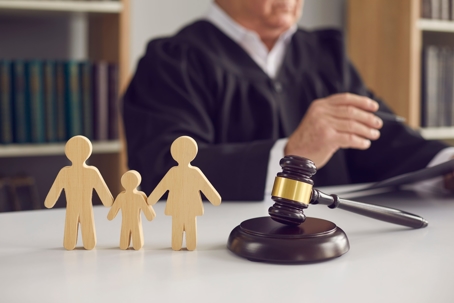Child custody cases are often viewed as two parents contesting how they try to convince the court to consider their rights and interests. But in reality, child custody cases are between three parties - the two parents and the children. Each parent is strongly encouraged to obtain their legal representative in a child custody case to argue and fight for a favorable outcome. However, children do not hire their legal representative to argue for their interests. Instead, the court-appointed Guardian ad Litem will look into a child custody case and make proper recommendations on what outcome is in the child’s best interest.
What is a Guardian ad Litem (GAL)?
The term Guardian ad Litem is translated to mean a "guardian for the lawsuit." Typically, a Guardian ad Litem are individuals, generally lawyers, that the judge of a family custody case appoints to do the following:
- Protect the rights and interests of the child;
- Conduct independent investigations and interviews;
- Provide the court with a report that analyzes the best interests of the child; and
- Participate in court hearings or mediations representing the interests of the child.
The Commonwealth of Virginia relies on the Guardian ad Litem to provide an independent recommendation to the court on what is best for their client, which is the child, which may not necessarily be what the child would want. This means that a Guardian ad Litem has to assess the family dynamics and the child's needs instead of simply taking in the child's preference.
It is essential to understand that a Guardian ad Litem only represents the child in the case and not either parent, even if the child is under the custody of one of the parents.
Why Does My Guardian ad Litem (GAL) Not Like Me?
There are numerous reasons why you might have a tense relationship with the appointed Guardian ad Litem or if you feel they might not like you or perceived not to like you. Some of the possible reasons for a challenging relationship with your Guardian ad Litem could be one of the following:
- If the GAL feels that you are not cooperating with them;
- If the GAL perceives that you do not respect their role in the child custody case.
- If the GAL determines that you are coaching your child on what to say to them or the court;
- If you send numerous texts and emails or call the GAL constantly without respecting their time or boundaries;
- If the GAL determines that you are not receptive or responsive to the needs of the child or the requests of the court; or
- If you are not prepared with the documents the GAL or the court has requested.
Should I Get Legal Counsel Even If a Guardian ad Litem (GAL) is Assigned to My Child Custody Case?
Absolutely. You should obtain legal counsel even if the court assigns a GAL to your child custody case.
In your child custody case, obtaining legal representation for your interest as a parent is vital. A Guardian ad Litem is not a lawyer that will represent your interests and rights as a parent. Instead, the court-appointed Guardian ad Litem is tasked to ensure that the rights and interests are represented solely from your child's perspective. The Guardian ad Litem will not consider the interests and rights of any parent. Hence, each parent must have a lawyer representing their respective interests. In addition, a lawyer representing your rights and interest can help you navigate how to deal with a Guardian ad Litem.
Does an Appointed Guardian ad Litem (GAL) Have Any Role in The Outcome of My Child Custody Case?
Yes, a Guardian ad Litem has a significant role in the outcome of a child custody case.
Even though a Guardian ad Litem is not a judge in your child custody case or a lawyer for the parties, they play a vital role in the child custody process and, ultimately, the case's outcome.
As noted above, a Guardian ad Litem is appointed by the court to assist them in the decision-making process by recommending what is best for the child based on the independent investigation they have conducted.

